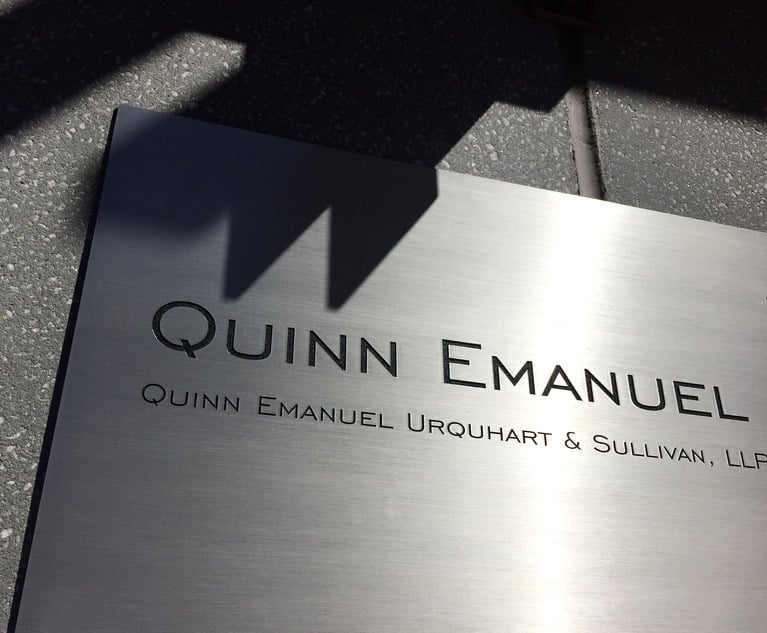A&O, Slaughter and May Lawyers Among Group Launching New Climate Change Advice
The group has drafted model contracts designed to help businesses and lawyers tackle the issue.
February 19, 2020 at 04:36 AM
2 minute read
 Firms have seen a recent uptick in interest from clients wishing to tackle climate change.
Firms have seen a recent uptick in interest from clients wishing to tackle climate change.
Lawyers at Allen & Overy, Clifford Chance and Slaughter and May are among a group of 63 firms and organisations to have worked together to launch new model contracts and laws aiming to help lawyers and businesses fight climate change.
The group of solicitors, barristers and academics, called the Chancery Lane Project, have worked pro bono to launch a two-pronged approach to the issue.
Two publications, the Climate Change Contract Playbook and the Green Paper of Model Laws, will launch this month. The playbook will contain 16 precedent clauses designed to help lawyers and businesses tackle issues such as building in green improvement obligations in supply contracts; terminating contracts and move to more climate-friendly suppliers and facilitating voluntary work on climate solutions by offering climate sabbaticals.
Meanwhile the green paper will set out seven model laws designed to help businesses accelerate the transition to net-zero emissions.
Other lawyers at firms including Hogan Lovells, Pinsent Masons and Norton Rose Fulbright are also taking part.
Caroline May, EMEA head of environment at Norton Rose Fulbright and member of the Chancery Lane Project steering group said in a statement: "The Chancery Lane project is a clarion call for the legal profession. Lawyers working together to frame a response to the most urgent issue of our times. Shaping laws which can drive real change. This is only the beginning of the story. I would encourage all lawyers whatever their specialism to embrace this initiative to see how working together we can make a difference."
The group held its first legal hackathon last November, with 120 lawyers working together to draft the first editions of the playbook and green paper.
Climate change has rocketed up law firms' agendas in recent years, as businesses they work with look for ways to improve their sustainability standing.
Several firms, including Ashurst and Freshfields Bruckhaus Deringer have appointed lawyers to lead their sustainability efforts.
Recent research by Law.com International found the majority of lawyers think law firms should be legally required to improve their environmental sustainability, while two thirds of survey respondents stated they believe the topic is important to their clients.
This content has been archived. It is available through our partners, LexisNexis® and Bloomberg Law.
To view this content, please continue to their sites.
Not a Lexis Subscriber?
Subscribe Now
Not a Bloomberg Law Subscriber?
Subscribe Now
NOT FOR REPRINT
© 2025 ALM Global, LLC, All Rights Reserved. Request academic re-use from www.copyright.com. All other uses, submit a request to [email protected]. For more information visit Asset & Logo Licensing.
You Might Like
View All
X Ordered to Release Data by German Court Amid Election Interference Concerns

Quinn Emanuel's Hamburg Managing Partner and Four-Lawyer Team Jump to Willkie Farr

Trump ICC Sanctions Condemned as ‘Brazen Attack’ on International Law

U.S.- China Trade War: Lawyers Label WTO Dispute Pointless, Clients Have Their Hands Tied
Law Firms Mentioned
Trending Stories
- 1States Accuse Trump of Thwarting Court's Funding Restoration Order
- 2Microsoft Becomes Latest Tech Company to Face Claims of Stealing Marketing Commissions From Influencers
- 3Coral Gables Attorney Busted for Stalking Lawyer
- 4Trump's DOJ Delays Releasing Jan. 6 FBI Agents List Under Consent Order
- 5Securities Report Says That 2024 Settlements Passed a Total of $5.2B
Who Got The Work
J. Brugh Lower of Gibbons has entered an appearance for industrial equipment supplier Devco Corporation in a pending trademark infringement lawsuit. The suit, accusing the defendant of selling knock-off Graco products, was filed Dec. 18 in New Jersey District Court by Rivkin Radler on behalf of Graco Inc. and Graco Minnesota. The case, assigned to U.S. District Judge Zahid N. Quraishi, is 3:24-cv-11294, Graco Inc. et al v. Devco Corporation.
Who Got The Work
Rebecca Maller-Stein and Kent A. Yalowitz of Arnold & Porter Kaye Scholer have entered their appearances for Hanaco Venture Capital and its executives, Lior Prosor and David Frankel, in a pending securities lawsuit. The action, filed on Dec. 24 in New York Southern District Court by Zell, Aron & Co. on behalf of Goldeneye Advisors, accuses the defendants of negligently and fraudulently managing the plaintiff's $1 million investment. The case, assigned to U.S. District Judge Vernon S. Broderick, is 1:24-cv-09918, Goldeneye Advisors, LLC v. Hanaco Venture Capital, Ltd. et al.
Who Got The Work
Attorneys from A&O Shearman has stepped in as defense counsel for Toronto-Dominion Bank and other defendants in a pending securities class action. The suit, filed Dec. 11 in New York Southern District Court by Bleichmar Fonti & Auld, accuses the defendants of concealing the bank's 'pervasive' deficiencies in regards to its compliance with the Bank Secrecy Act and the quality of its anti-money laundering controls. The case, assigned to U.S. District Judge Arun Subramanian, is 1:24-cv-09445, Gonzalez v. The Toronto-Dominion Bank et al.
Who Got The Work
Crown Castle International, a Pennsylvania company providing shared communications infrastructure, has turned to Luke D. Wolf of Gordon Rees Scully Mansukhani to fend off a pending breach-of-contract lawsuit. The court action, filed Nov. 25 in Michigan Eastern District Court by Hooper Hathaway PC on behalf of The Town Residences LLC, accuses Crown Castle of failing to transfer approximately $30,000 in utility payments from T-Mobile in breach of a roof-top lease and assignment agreement. The case, assigned to U.S. District Judge Susan K. Declercq, is 2:24-cv-13131, The Town Residences LLC v. T-Mobile US, Inc. et al.
Who Got The Work
Wilfred P. Coronato and Daniel M. Schwartz of McCarter & English have stepped in as defense counsel to Electrolux Home Products Inc. in a pending product liability lawsuit. The court action, filed Nov. 26 in New York Eastern District Court by Poulos Lopiccolo PC and Nagel Rice LLP on behalf of David Stern, alleges that the defendant's refrigerators’ drawers and shelving repeatedly break and fall apart within months after purchase. The case, assigned to U.S. District Judge Joan M. Azrack, is 2:24-cv-08204, Stern v. Electrolux Home Products, Inc.
Featured Firms
Law Offices of Gary Martin Hays & Associates, P.C.
(470) 294-1674
Law Offices of Mark E. Salomone
(857) 444-6468
Smith & Hassler
(713) 739-1250








